
Ryan Smith
@rssmith.bsky.social
Associate Professor at the Laureate Institute for Brain Research. My lab focuses on computational neuroscience and psychiatry, emotion-cognition interactions, prospective planning, exploration, and interoception.
Reposted by Ryan Smith
Very excited to be attending #IWAI2025 in Montreal🍁 organised by David Benrimoh!! already heard some great talks by @rssmith.bsky.social and team 🧠💡
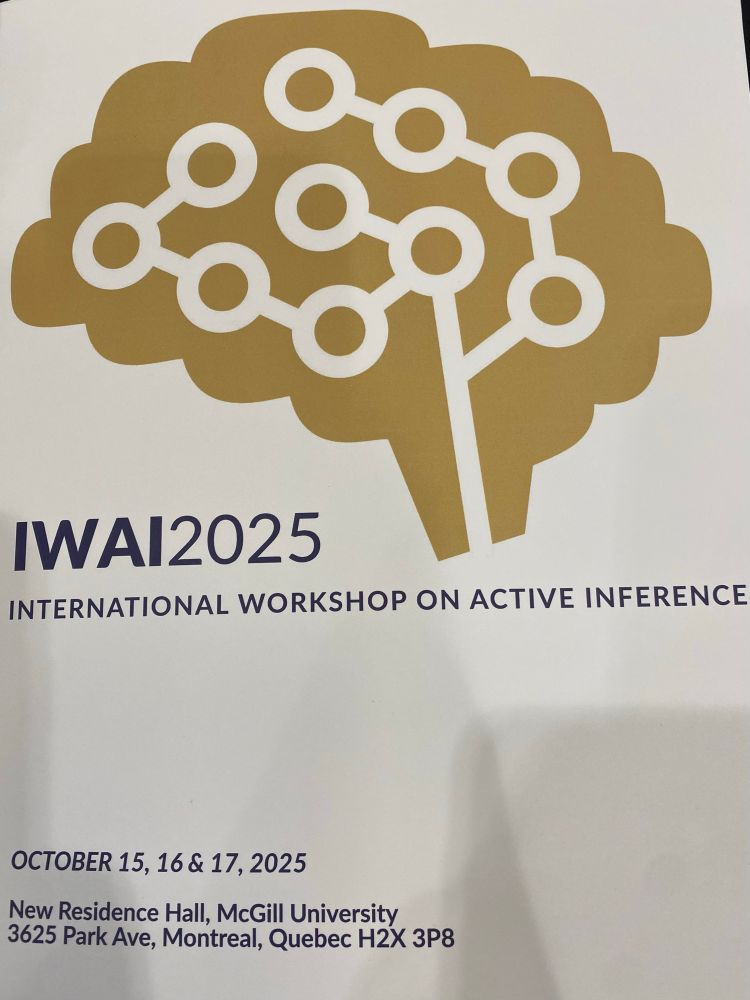
October 15, 2025 at 4:31 PM
Very excited to be attending #IWAI2025 in Montreal🍁 organised by David Benrimoh!! already heard some great talks by @rssmith.bsky.social and team 🧠💡
Reposted by Ryan Smith
Even after recovery, relapse is heartbreakingly common in anorexia nervosa. Could the answer lie in the gut’s hidden signals? 🧵

September 22, 2025 at 8:14 PM
Even after recovery, relapse is heartbreakingly common in anorexia nervosa. Could the answer lie in the gut’s hidden signals? 🧵
Big congrats to Marishka on this. I know how much time and effort went into it. Really happy to see it out! For those interested, she replicated prior longitudinal results using an approach-avoidance conflict task and showed how model parameters afforded out-of-sample clinical prediction.
New paper in CPsy - 'Computational Mechanisms of Approach-Avoidance Conflict Predictively Differentiate Between Affective and Substance Use Disorders' from Marishka Mehta and the group of @rssmith.bsky.social
doi.org/10.5334/cpsy...
doi.org/10.5334/cpsy...

Computational Mechanisms of Approach-Avoidance Conflict Predictively Differentiate Between Affective and Substance Use Disorders | Computational Psychiatry
doi.org
September 16, 2025 at 4:16 AM
Big congrats to Marishka on this. I know how much time and effort went into it. Really happy to see it out! For those interested, she replicated prior longitudinal results using an approach-avoidance conflict task and showed how model parameters afforded out-of-sample clinical prediction.
Agreed. The video examples are super interesting. I wish the questions were asked in a more controlled way, but I can’t fault for some limitations of this rarely possible type of work. It seemed quite somatic and abrupt. No spontaneous descriptions of emotion proper either. Only when given a word.
(buried in a reply, but) This is mind-blowing & deserves a post. Scroll to "video" in this article to watch what happens when the human hypothalamus is stimulated: it's a combo of embarrassment/shame and intense body sensations emanating from the heart. WOW.
www.brainstimjrnl.com/article/S193...
www.brainstimjrnl.com/article/S193...
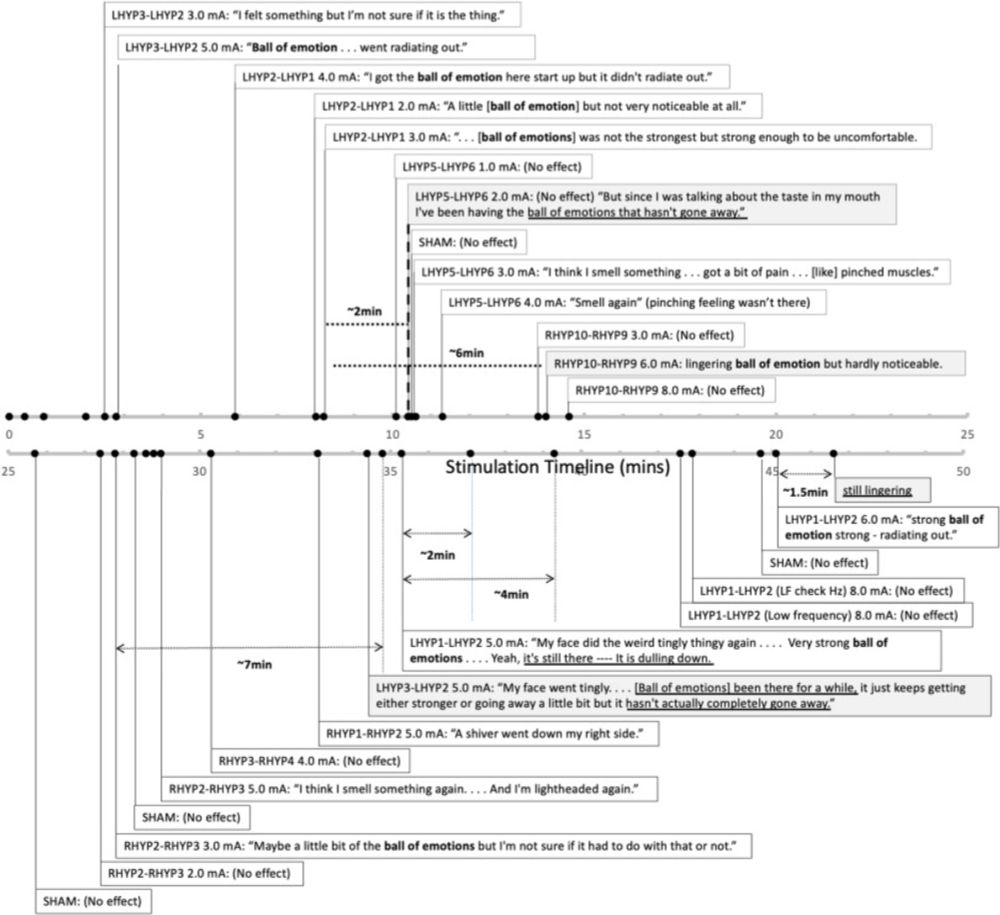
Complex negative emotions induced by electrical stimulation of the human hypothalamus
Stimulation of the ventromedial hypothalamic region in animals has been reported to
cause attack behavior labeled as sham-rage without offering information about the
internal affective state of the an...
www.brainstimjrnl.com
July 13, 2025 at 3:16 PM
Agreed. The video examples are super interesting. I wish the questions were asked in a more controlled way, but I can’t fault for some limitations of this rarely possible type of work. It seemed quite somatic and abrupt. No spontaneous descriptions of emotion proper either. Only when given a word.
Reposted by Ryan Smith
Computational modeling revealed that individuals with methamphetamine use disorder show reduced information-seeking and slower belief updating when trying to maximize long-term reward.
@torutakahashi.bsky.social @rssmith.bsky.social
www.nature.com/articles/s44...
@torutakahashi.bsky.social @rssmith.bsky.social
www.nature.com/articles/s44...

Individuals with methamphetamine use disorder show reduced directed exploration and learning rates independent of an aversive interoceptive state induction - Communications Psychology
Computational modeling revealed that individuals with methamphetamine use disorder show reduced information-seeking and slower belief-updating when trying to maximize long-term reward. This might crea...
www.nature.com
June 10, 2025 at 7:14 AM
Computational modeling revealed that individuals with methamphetamine use disorder show reduced information-seeking and slower belief updating when trying to maximize long-term reward.
@torutakahashi.bsky.social @rssmith.bsky.social
www.nature.com/articles/s44...
@torutakahashi.bsky.social @rssmith.bsky.social
www.nature.com/articles/s44...
Congratulations to @torutakahashi.bsky.social and Carter Goldman on their newly published paper!
This paper shows that individuals with methamphetamine use disorder show reduced directed exploration and slower dynamic learning rates in both high/low anxiety states
www.nature.com/articles/s44...
This paper shows that individuals with methamphetamine use disorder show reduced directed exploration and slower dynamic learning rates in both high/low anxiety states
www.nature.com/articles/s44...

Individuals with methamphetamine use disorder show reduced directed exploration and learning rates independent of an aversive interoceptive state induction - Communications Psychology
Computational modeling revealed that individuals with methamphetamine use disorder show reduced information-seeking and slower belief-updating when trying to maximize long-term reward. This might crea...
www.nature.com
June 9, 2025 at 3:55 PM
Congratulations to @torutakahashi.bsky.social and Carter Goldman on their newly published paper!
This paper shows that individuals with methamphetamine use disorder show reduced directed exploration and slower dynamic learning rates in both high/low anxiety states
www.nature.com/articles/s44...
This paper shows that individuals with methamphetamine use disorder show reduced directed exploration and slower dynamic learning rates in both high/low anxiety states
www.nature.com/articles/s44...
Reposted by Ryan Smith
I am so excited to share that our paper 'A neural basis for distinguishing imagination from reality' is now published in @cp-neuron.bsky.social! 🧠✨ See thread below! doi.org/10.1016/j.ne...
June 5, 2025 at 3:05 PM
I am so excited to share that our paper 'A neural basis for distinguishing imagination from reality' is now published in @cp-neuron.bsky.social! 🧠✨ See thread below! doi.org/10.1016/j.ne...
Reposted by Ryan Smith
this is excellent - congratulations!
In particular nice to see the very robust basic pruning behavioural effect replicate in this version of the task (originally designed for the scanner). It seems that pruning may end up being more relevant to SUD than MDD, @docqhuys.bsky.social!
In particular nice to see the very robust basic pruning behavioural effect replicate in this version of the task (originally designed for the scanner). It seems that pruning may end up being more relevant to SUD than MDD, @docqhuys.bsky.social!
May 27, 2025 at 6:13 AM
this is excellent - congratulations!
In particular nice to see the very robust basic pruning behavioural effect replicate in this version of the task (originally designed for the scanner). It seems that pruning may end up being more relevant to SUD than MDD, @docqhuys.bsky.social!
In particular nice to see the very robust basic pruning behavioural effect replicate in this version of the task (originally designed for the scanner). It seems that pruning may end up being more relevant to SUD than MDD, @docqhuys.bsky.social!
Reposted by Ryan Smith
Thank you @clairelavalley.bsky.social and @rssmith.bsky.social. Striking to see aversive pruning altered in people with methamphetamine use, particularly given the results in depression (dx.doi.org/10.1017/S003...).
May 26, 2025 at 7:38 PM
Thank you @clairelavalley.bsky.social and @rssmith.bsky.social. Striking to see aversive pruning altered in people with methamphetamine use, particularly given the results in depression (dx.doi.org/10.1017/S003...).
Huge congrats to @clairelavalley.bsky.social on this new paper. www.nature.com/articles/s41.... Results show that methamphetamine users show a specific deficit in model-based planning, in which they fail to simulate plans with large short-term losses (elevated aversive pruning). Brief thread below!
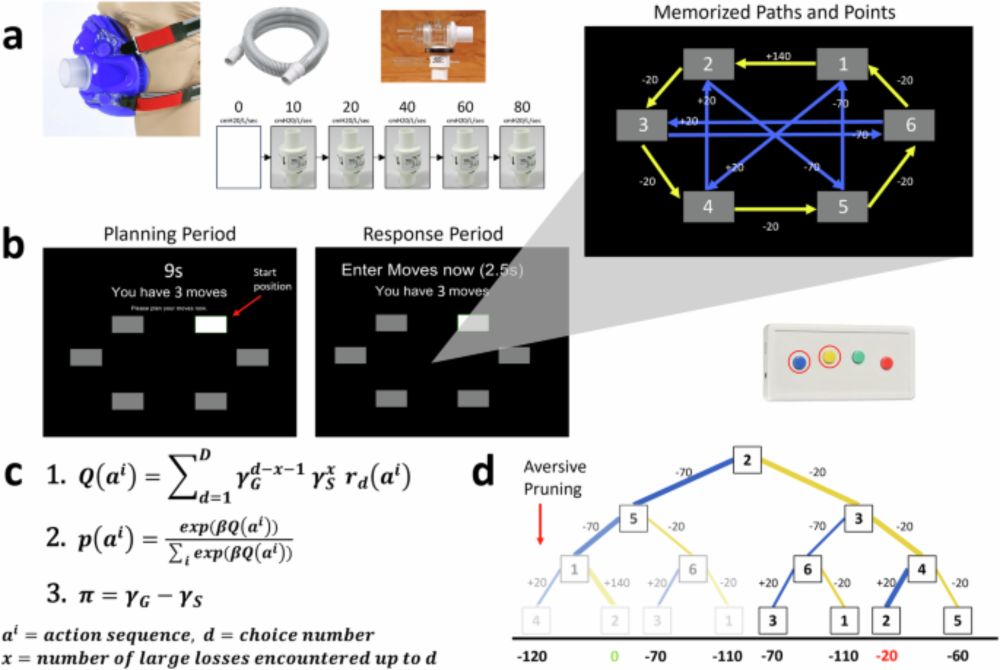
Computational mechanisms underlying multi-step planning deficits in methamphetamine use disorder - Translational Psychiatry
Translational Psychiatry - Computational mechanisms underlying multi-step planning deficits in methamphetamine use disorder
www.nature.com
May 25, 2025 at 4:16 PM
Huge congrats to @clairelavalley.bsky.social on this new paper. www.nature.com/articles/s41.... Results show that methamphetamine users show a specific deficit in model-based planning, in which they fail to simulate plans with large short-term losses (elevated aversive pruning). Brief thread below!
Congratulations to co-first author @clairelavalley.bsky.social on validating this new performance-based measure of social emotion regulation ability: emotionandpsychopathology.org/journal/arti...
In psychopathology, this may be crucial for maintaining social support. We hope others find it useful!
In psychopathology, this may be crucial for maintaining social support. We hope others find it useful!
The Inter-Personal Affect Regulation Test (IPART): Development and Validation of a Performance-Based Assessment of the Ability to Improve the Emotions of Others
| Journal of Emotion and Psyc...
emotionandpsychopathology.org
April 29, 2025 at 4:20 PM
Congratulations to co-first author @clairelavalley.bsky.social on validating this new performance-based measure of social emotion regulation ability: emotionandpsychopathology.org/journal/arti...
In psychopathology, this may be crucial for maintaining social support. We hope others find it useful!
In psychopathology, this may be crucial for maintaining social support. We hope others find it useful!
Very excited to congratulate Ning Li and @clairelavalley.bsky.social on their new paper published in Molecular Psychiatry.
"Directed exploration is reduced by an aversive interoceptive state induction in healthy individuals but not in those with affective disorders" (nature.com/articles/s41...) 🧵👇
"Directed exploration is reduced by an aversive interoceptive state induction in healthy individuals but not in those with affective disorders" (nature.com/articles/s41...) 🧵👇
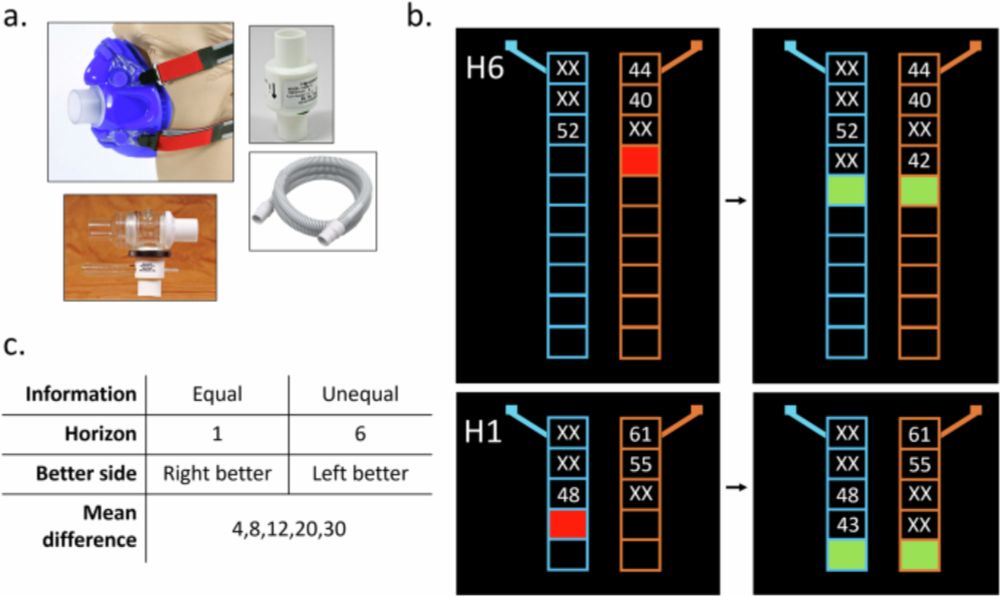
Directed exploration is reduced by an aversive interoceptive state induction in healthy individuals but not in those with affective disorders - Molecular Psychiatry
Molecular Psychiatry - Directed exploration is reduced by an aversive interoceptive state induction in healthy individuals but not in those with affective disorders
nature.com
April 6, 2025 at 3:56 PM
Very excited to congratulate Ning Li and @clairelavalley.bsky.social on their new paper published in Molecular Psychiatry.
"Directed exploration is reduced by an aversive interoceptive state induction in healthy individuals but not in those with affective disorders" (nature.com/articles/s41...) 🧵👇
"Directed exploration is reduced by an aversive interoceptive state induction in healthy individuals but not in those with affective disorders" (nature.com/articles/s41...) 🧵👇
Reposted by Ryan Smith
Out today in PNAS! We asked how Bayesian inference is implemented in macaque prefrontal cortex www.pnas.org/doi/10.1073/...
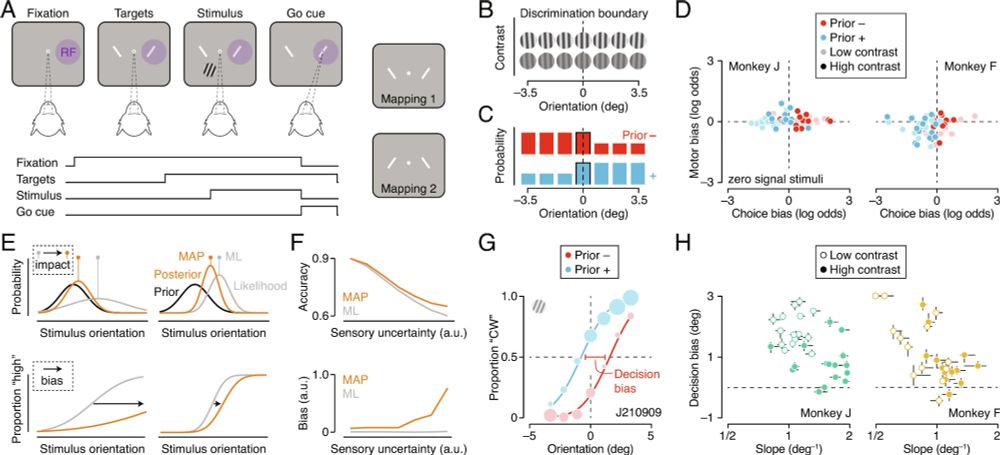
Bayesian inference by visuomotor neurons in the prefrontal cortex | PNAS
Perceptual judgments of the environment emerge from the concerted activity of neural
populations in decision-making areas downstream of the sensory...
www.pnas.org
March 27, 2025 at 7:54 PM
Out today in PNAS! We asked how Bayesian inference is implemented in macaque prefrontal cortex www.pnas.org/doi/10.1073/...
Reinforcement Learning and Active Inference are two frameworks used in computational psychiatry, but these are rarely directly compared empirically. In this new article, we aimed to compare these in a more systematic manner by fitting each to multiple datasets: papers.ssrn.com/sol3/papers....
A Systematic Empirical Comparison of Active Inference and Reinforcement Learning Models in Accounting for Decision-Making Under Uncertainty
Reinforcement Learning (RL) and Active Inference (AInf) are related computational frameworks for modeling learning and choice under uncertainty. However, differ
papers.ssrn.com
March 27, 2025 at 7:22 PM
Reinforcement Learning and Active Inference are two frameworks used in computational psychiatry, but these are rarely directly compared empirically. In this new article, we aimed to compare these in a more systematic manner by fitting each to multiple datasets: papers.ssrn.com/sol3/papers....
Reposted by Ryan Smith
I'm excited to attend the #ECNP Workshop on Applied Neuroscience and present our findings on markers of abnormal gastrointestinal interoception predicting relapse in anorexia nervosa. Catch Poster P107 on Thursday, March 20, & my oral presentation on Friday, March 21, at 9:10 AM

March 12, 2025 at 7:14 PM
I'm excited to attend the #ECNP Workshop on Applied Neuroscience and present our findings on markers of abnormal gastrointestinal interoception predicting relapse in anorexia nervosa. Catch Poster P107 on Thursday, March 20, & my oral presentation on Friday, March 21, at 9:10 AM
Congrats to Marishka Mehta on her new chapter! She did a great job summarizing the current state of the field and important future directions. link.springer.com/chapter/10.1...
"Computational Approaches for Uncovering Interoceptive Mechanisms in Psychiatric Disorders and Their Biological Basis"
"Computational Approaches for Uncovering Interoceptive Mechanisms in Psychiatric Disorders and Their Biological Basis"

Computational Approaches for Uncovering Interoceptive Mechanisms in Psychiatric Disorders and Their Biological Basis
Interoception, the process of detecting, perceiving, and interpreting signals from within the body, is essential for physiological regulation and adaptive behavior. A growing body of research undersco...
link.springer.com
February 28, 2025 at 10:14 PM
Congrats to Marishka Mehta on her new chapter! She did a great job summarizing the current state of the field and important future directions. link.springer.com/chapter/10.1...
"Computational Approaches for Uncovering Interoceptive Mechanisms in Psychiatric Disorders and Their Biological Basis"
"Computational Approaches for Uncovering Interoceptive Mechanisms in Psychiatric Disorders and Their Biological Basis"
Excited to congratulate Marishka Mehta on her new preprint (www.medrxiv.org/content/10.1...) combining modeling, machine learning, and longitudinal clinical data.
"Computational Mechanisms of Approach-Avoidance Conflict Predictively Differentiate Between Affective and Substance Use Disorders"
"Computational Mechanisms of Approach-Avoidance Conflict Predictively Differentiate Between Affective and Substance Use Disorders"

Computational Mechanisms of Approach-Avoidance Conflict Predictively Differentiate Between Affective and Substance Use Disorders
Psychiatric disorders are highly heterogeneous and often co-morbid, posing specific challenges for effective treatment. Recently, computational modeling has emerged as a promising approach for charact...
www.medrxiv.org
February 13, 2025 at 8:55 PM
Excited to congratulate Marishka Mehta on her new preprint (www.medrxiv.org/content/10.1...) combining modeling, machine learning, and longitudinal clinical data.
"Computational Mechanisms of Approach-Avoidance Conflict Predictively Differentiate Between Affective and Substance Use Disorders"
"Computational Mechanisms of Approach-Avoidance Conflict Predictively Differentiate Between Affective and Substance Use Disorders"
Reposted by Ryan Smith
@rssmith.bsky.social and I are working on a symposium proposal on interoceptive and embodied computational psychiatry for this - do let us know if you would like to join as we have open slots. Focus is on quantification and intervention.
Poster submissions for the Computational Psychiatry Conference 2025 in Tübingen are now open. Deadline is 7th February. Symposium submissions are open until 15th January. www.cpconf.org. Please RB.

Computational Psychiatry Conference
Tübingen, Germany (July 14-16, 2025)
www.cpconf.org
January 10, 2025 at 7:40 AM
@rssmith.bsky.social and I are working on a symposium proposal on interoceptive and embodied computational psychiatry for this - do let us know if you would like to join as we have open slots. Focus is on quantification and intervention.
Reposted by Ryan Smith
Poster submissions for the Computational Psychiatry Conference 2025 in Tübingen are now open. Deadline is 7th February. Symposium submissions are open until 15th January. www.cpconf.org. Please RB.

Computational Psychiatry Conference
Tübingen, Germany (July 14-16, 2025)
www.cpconf.org
January 9, 2025 at 11:13 PM
Poster submissions for the Computational Psychiatry Conference 2025 in Tübingen are now open. Deadline is 7th February. Symposium submissions are open until 15th January. www.cpconf.org. Please RB.
Reposted by Ryan Smith
I could not find a body representation starter pack so I made one! Please message if you want to join. I know I missed excellent scientists, philosophers and clinicians out there go.bsky.app/EAmckAo
January 8, 2025 at 12:12 PM
I could not find a body representation starter pack so I made one! Please message if you want to join. I know I missed excellent scientists, philosophers and clinicians out there go.bsky.app/EAmckAo
Reposted by Ryan Smith
Human cortical pyramidal neurons are larger, with more elaborate branching, and distinct nonlinear biophysical properties compared to rat cortical pyramidal neurons.
Are they more functionally complex? Could that boost the human brain’s computational power? and is that what makes us human? (1/11)
Are they more functionally complex? Could that boost the human brain’s computational power? and is that what makes us human? (1/11)
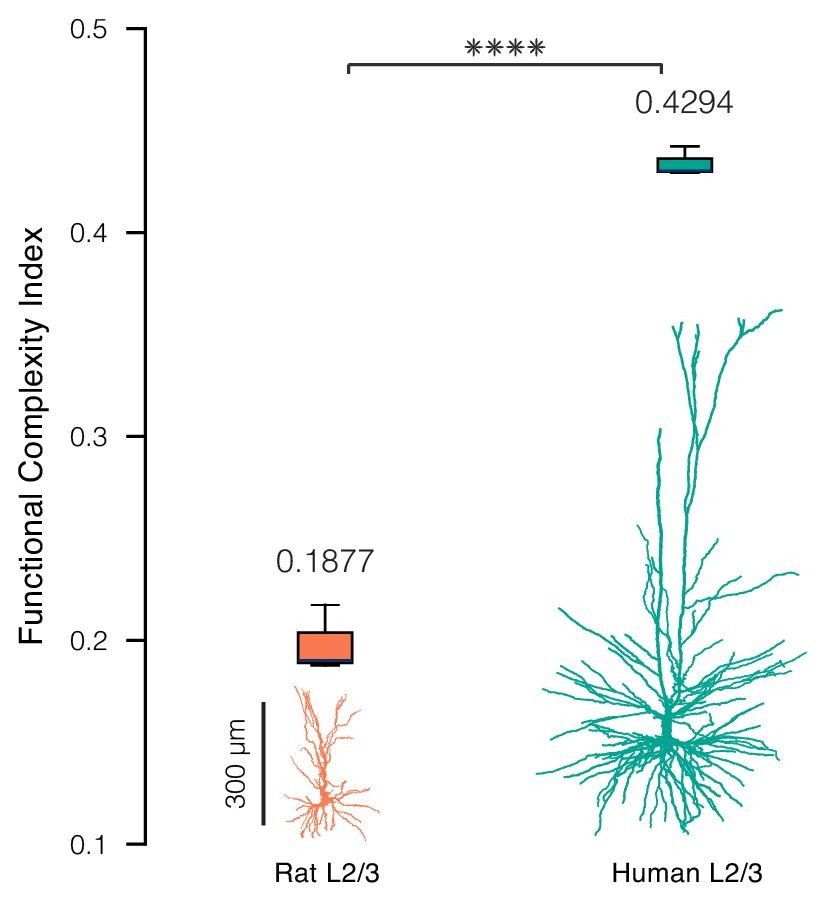
December 26, 2024 at 5:31 PM
Human cortical pyramidal neurons are larger, with more elaborate branching, and distinct nonlinear biophysical properties compared to rat cortical pyramidal neurons.
Are they more functionally complex? Could that boost the human brain’s computational power? and is that what makes us human? (1/11)
Are they more functionally complex? Could that boost the human brain’s computational power? and is that what makes us human? (1/11)
Just switching over to Bluesky now. Looking forward to good discussions and finding out about new papers again!
December 14, 2024 at 10:01 PM
Just switching over to Bluesky now. Looking forward to good discussions and finding out about new papers again!

